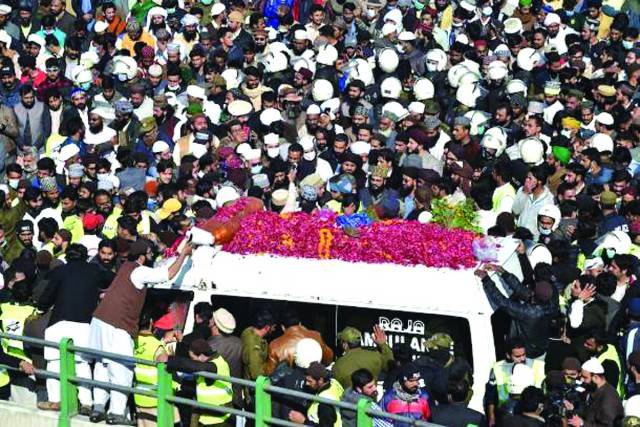
The hardline Islamist cleric and founder of the Tehreek-e-Labaik passed away in Lahore after three very successful sit-ins in the federal capital of Pakistan, resulting in the complete capitulation of the federal government and acceptance of all the demands tabled by the religious political group led by Khadim Rizvi. The first protest sit-in was in 2016 when Islamabad was cut off from the rest of the country, demanding the hanging of Aasia Bibi who was accused of blasphemy and later acquitted by the Supreme Court. The second dharna was in 2017 demanding the resignation of the federal law minister for attempting a change in the blasphemy law and now the final protest in 2020 against the publication of some cartoons by a magazine in France. Protests lasted several weeks, resulting in the death of some citizens. Once again, the government gave in to the demands of religious fanatics and agreed to expel the French ambassador and to boycott all French products in Pakistan. It now appears that national policy is now being made, not in Parliament but by the dictates of illiterate mullahs in control of fanatic mobs on the streets of the country.
Religion has been a potent driving force for the independence of Muslims in the Indian sub-continent. It has dominated social, political and economic philosophy of Muslims throughout the centuries of Muslim rule in India. Muslim heroes like Iqbal, Sir Syed, Hasrat Mohani, Mohammad Ali Jauhar and many other prolific writers urged the Muslims of India to rise up and regain their glorious past. After Partition in 1947, the role of religion in state affairs emerged for the first time in 1949 in the shape of the Objectives Resolution that was made a preamble to the constitution of the country. Father of the nation Mohammed Ali Jinnah, however, in his speech to the Constituent Assembly restricted the role of religion and publicly acknowledged the universal principle of separation of state and religion. After the separation of East Pakistan in 1971, it was made abundantly clear that religion is definitely a secondary issue in matters of state.
The obscurantist fanatical mobs under Khadim Rizvi failed miserably in winning any seats in parliament but still managed to pull over two million votes in the national elections proving the popularity and following of his archaic ideas based on a fundamentalist religious philosophy. This following and popularity gave him the confidence and audacity to reprimand and criticize the superior judiciary and the army high command and even to call for the death of supreme court judges and the resignation of army generals putting him in direct conflict with the powerful civil and military establishment. The death of Khadim Rizvi saw the biggest funeral procession in the history of the country with messages of sympathy and condolences from the prime minister and the army chief and outpouring of grief from the doyens of the media.
The country first started to patronize militant religious forces with the start of the state policy to wage proxy war in Kashmir with the aim of bleeding India with the use of an irregular force of volunteers recruited from Islamic militant groups full of religious fervor and prepared to lay down their lives for Islam and for the cause of establishing the rule of Sharia in the country. Pro-Islamic militants were used in Kashmir to liberate the valley from the yoke of Indian forces.
After the fall of Bhutto, Pakistan was in the firm grip of another military dictator General Ziaul Haque, who started the policy of Islamization of the country and the implementation of Islamic laws or Sharia. Zia became the first Pakistani head of state to attend the annual gathering of the Tablighi Jamaat at Raiwind in 1979. This was also the year when Soviet forces invaded Afghanistan and the long bitter struggle between Afghan freedom fighters and the Soviet occupation forces began. And this was the start of the country’s slide into the Jihadi culture. Islamic parties in Pakistan with the active support of the government and material support from the USA Saudi Arabia and other western countries now answered the call of their religious duty to provide volunteers for their covert and overt armed resistance against the USSR. Senior Pakistani officers imbibed with religious fervor now made no secret of their involvement with the national and international Jihadi outfits in the country and in Afghanistan. During the 1980s, two senior members of the army - namely General Jawaid Nasir and General Hamid Gul - were very active and vocal in providing support training and arms to the militant outfits in the Pak-Afghan theatre of war against the USSR.
After 9/11 and the US-led war on terror, Pakistan has faced death, destruction, chaos and mayhem across the length and breadth of the country. Over 70,000 Pakistanis have lost their lives in suicide bombings and our armed forces have suffered casualties at the hands of the Taliban and other religious militant forces. This explosive mixture of religion and the use of force to impose the rule of Sharia law is destroying the very foundations of our country. After the happenings of 9/11 the Musharraf government tried to distance itself from jihadi groups and some militant groups were banned. This action was too little too late and the chaos and carnage of the jihadi adventure continued to wreak havoc in the country.
Pakistan’s much needed search for peace, security and stability is ongoing. Political and military leaders of the country must wake up to the reality that use of religion for any socio-political agenda always results in chaos, death and destruction and the complete separation of state and religion is the only way to achieve peace and prosperity in the country.

Religion has been a potent driving force for the independence of Muslims in the Indian sub-continent. It has dominated social, political and economic philosophy of Muslims throughout the centuries of Muslim rule in India. Muslim heroes like Iqbal, Sir Syed, Hasrat Mohani, Mohammad Ali Jauhar and many other prolific writers urged the Muslims of India to rise up and regain their glorious past. After Partition in 1947, the role of religion in state affairs emerged for the first time in 1949 in the shape of the Objectives Resolution that was made a preamble to the constitution of the country. Father of the nation Mohammed Ali Jinnah, however, in his speech to the Constituent Assembly restricted the role of religion and publicly acknowledged the universal principle of separation of state and religion. After the separation of East Pakistan in 1971, it was made abundantly clear that religion is definitely a secondary issue in matters of state.
The obscurantist fanatical mobs under Khadim Rizvi failed miserably in winning any seats in parliament but still managed to pull over two million votes in the national elections proving the popularity and following of his archaic ideas based on a fundamentalist religious philosophy. This following and popularity gave him the confidence and audacity to reprimand and criticize the superior judiciary and the army high command and even to call for the death of supreme court judges and the resignation of army generals putting him in direct conflict with the powerful civil and military establishment. The death of Khadim Rizvi saw the biggest funeral procession in the history of the country with messages of sympathy and condolences from the prime minister and the army chief and outpouring of grief from the doyens of the media.
The country first started to patronize militant religious forces with the start of the state policy to wage proxy war in Kashmir with the aim of bleeding India with the use of an irregular force of volunteers recruited from Islamic militant groups full of religious fervor and prepared to lay down their lives for Islam and for the cause of establishing the rule of Sharia in the country. Pro-Islamic militants were used in Kashmir to liberate the valley from the yoke of Indian forces.
After the fall of Bhutto, Pakistan was in the firm grip of another military dictator General Ziaul Haque, who started the policy of Islamization of the country and the implementation of Islamic laws or Sharia. Zia became the first Pakistani head of state to attend the annual gathering of the Tablighi Jamaat at Raiwind in 1979. This was also the year when Soviet forces invaded Afghanistan and the long bitter struggle between Afghan freedom fighters and the Soviet occupation forces began. And this was the start of the country’s slide into the Jihadi culture. Islamic parties in Pakistan with the active support of the government and material support from the USA Saudi Arabia and other western countries now answered the call of their religious duty to provide volunteers for their covert and overt armed resistance against the USSR. Senior Pakistani officers imbibed with religious fervor now made no secret of their involvement with the national and international Jihadi outfits in the country and in Afghanistan. During the 1980s, two senior members of the army - namely General Jawaid Nasir and General Hamid Gul - were very active and vocal in providing support training and arms to the militant outfits in the Pak-Afghan theatre of war against the USSR.
After 9/11 and the US-led war on terror, Pakistan has faced death, destruction, chaos and mayhem across the length and breadth of the country. Over 70,000 Pakistanis have lost their lives in suicide bombings and our armed forces have suffered casualties at the hands of the Taliban and other religious militant forces. This explosive mixture of religion and the use of force to impose the rule of Sharia law is destroying the very foundations of our country. After the happenings of 9/11 the Musharraf government tried to distance itself from jihadi groups and some militant groups were banned. This action was too little too late and the chaos and carnage of the jihadi adventure continued to wreak havoc in the country.
Pakistan’s much needed search for peace, security and stability is ongoing. Political and military leaders of the country must wake up to the reality that use of religion for any socio-political agenda always results in chaos, death and destruction and the complete separation of state and religion is the only way to achieve peace and prosperity in the country.


